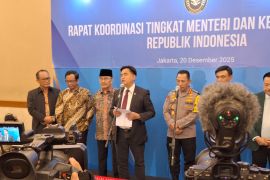"Specifically, there was a decrease in the number of deposits and customers who saved, the amount of loans disbursed, and customers who borrowed, along with increased Non-Performing Loans, decreased net cash flow and net profit, as well as the number of permanent human resources," Tuti Ermawati, a researcher at the LIPI Economic Research Center, stated during a virtual seminar titled "Portraits of Microfinance Institutions during the COVID-19 Pandemic: Mitigation and Adaptation" in Jakarta, Tuesday.
LPM are institutions that distribute credit/financing to micro and small enterprises (SMEs), including Rural Banks, Sharia Rural Banks, savings and loan cooperatives, micro financial institutions (LKM), Islamic microfinance institutions (LKMS), Integrated Independent Business Center and Pawnshop.
"In general, COVID-19 has affected LPM, particularly their financial performance," he pointed out.
Ermawati stated that rapid assessments through online surveys and focus group discussions were conducted from August 1 to September 10, 2020, for 698 respondents and 277 respondents that met the requirements for analysis.
The existence of LPM cannot be separated from the development of micro and small enterprises (UMK), while the COVID-19 pandemic has resulted in a decline in the performance of micro and small businesses.
The role of MSMEs during the pandemic is expected to increase to expedite the nation’s economic recovery, as micro, small and medium enterprises (MSMEs) remain the backbone of the Indonesian economy, contributing 60 percent of the gross domestic product.
The government, through the Ministry of Finance, has issued a fiscal stimulus policy. The fiscal stimulus, including relaxation or restructuring of MSE credit at banks, rural banks, and finance companies, is aimed at promoting economic recovery.
LIPI Deputy for Community and Social Sciences Tri Nuke Pudjiastuti stated that this policy offered a fresh glimmer of hope to the banking sector and other financial institutions that legally meet the criteria for channeling these incentives.
"The financing requirements of MSEs are getting bigger," he stated.
Several other non-bank financial sectors practically partake in spurring economic growth through micro credit services but are not part of the implementation of these policies, Pudjiastuti stated. Related news: LIPI envisages business models changing in new normal amid COVID-19
Related news: Government to combine domestic, global financing to combat deficit
EDITED BY INE
Translator: Martha H, Azis Kurmala
Editor: Suharto
Copyright © ANTARA 2020











